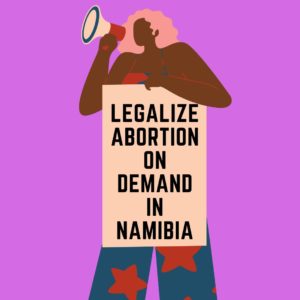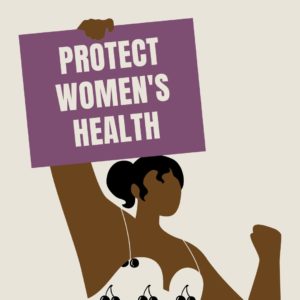One too many Namibian women have lost their lives as a direct result of illegal abortion. One too many Namibian women have lost their freedom due to the criminalisation of abortion. One too many Namibian families are deprived of the opportunity to properly plan for the adequate financial, emotional and physical care of their children when contraceptives fail, are inaccessible or are in short supply.
One too many Namibian girls are robbed of their right to complete their education due to the high rate of teenage pregnancy. One too many Namibian women are unable to seek out health care for post-abortion care after a failed, unsafe, illegal abortion and thus suffer in silence. Women are saying enough is enough!
It is sad and disappointing that in 2020, women in Namibia are still pleading with the government to allow us to access the full abundance of our Sexual and Reproductive Health and Rights. For the last decades, we have fought for our freedom and continue to do so. We have launched a petition seeking to legalise abortion-on-demand and grant Namibian women their reproductive justice.
Thousands of us continue to call for the amendment of the Apartheid-era Abortion and Sterilisation Act of South Africa (1975), which Namibia inherited before gaining independence in March 1990 and remains the sole legal instrument. Namibia is not alone, most of the African countries remain with restrictive and largely colonially inherited laws on abortion with few grounds for legal abortion. So far only South Africa, Cape Verde and Tunisia guarantee abortion without restrictions or any reason.
The proportion of pregnancies ending in abortion ranges from 12% in Western Africa to 24% in Southern Africa; rates in Central, Eastern and Northern Africa are 13%, 14% and 23%, respectively, according to Guttmacher Institute data.
Africa is the world region with the highest number of abortion-related deaths. In 2014, at least 9% of maternal mortality (or 16,000 deaths) in Africa were from unsafe abortion.
It’s only recently that the government of Namibia decriminalised the act of abandoning a newborn baby, which activists said was usually the result of difficulties in obtaining an abortion. In March 2017, former Health Minister said more than 7,000 illegal abortions were recorded at state health facilities in 2016, but the number is higher in reality since not all abortions carried out are recorded in this criminalised environment.
Activists in Namibia have rallied together with this petition launched on June 12, 2020, which has since garnered 41,000 signatures and counting. The petition already has been delivered to various ministries in Namibia, namely the Ministries of Health, Gender Equality, Justice and Youth respectively.
The Minister of Health and Social Services, Dr.Kalumbi Shangula, has stated that he is willing to push for the legalisation of all abortion if he has the support of Namibian women to do so. The Deputy Minister, Dr Esther Muinjangua, tabled the motion to debate legalisation of abortion in parliament. The parliamentary debate on abortion law reform will be on July 02, 2020.
Why are we being denied the freedom of choice to decide what happens with our own bodies? Why are our lives not valued enough to prevent deaths resulting from unsafe and illegal abortions? Why is an apartheid abortion law still chaining Namibian women to its shackles?

Abortion is a method of family planning and as such, should form part and parcel of reproductive health services offered in Namibia. Family planning is about being able to decide if and when to have a child or children, as well as the spacing of those children; and so, abortion, just like emergency contraceptives and long-term contraceptives all form part of family planning. Talking about family planning without talking about abortion, is speaking a half-truth.
According to the Namibian Demographic Health Survey of 2017, the national average of women and girls of reproductive age is 50%. The use of contraception only reduces the need for abortion but does not entirely eliminate the need for safe and legal abortion for all women regardless of the circumstances under which they got pregnant. Contraceptives are not perfect, nor are they consistently available to all Namibian women at all times. The responsibility of preventing unwanted or unplanned pregnancies, carrying pregnancies to term and raising children is placed squarely on the Namibian women, and yet we do not have the liberty to choose to opt-out of that responsibility.
Namibian women are forced into carrying an unwanted pregnancy to term, condemned as criminals for failing to use contraceptives effectively or not being able to negotiate safe sex with abusive partners or die due to a dangerous backdoor abortion. These are the horrific options that Namibian women are left with. The apartheid-era abortion law that was developed during a time when the majority of Namibians were not seen as equals, and human rights were denied to Black People should not be allowed to continue oppressing Black women.
The criminalisation of abortion is not only an extension of the racist system we endured, but it is also upheld by class privilege.
Women from privileged backgrounds and social status have financial means and can access safe and legal abortions in neighbouring countries like South Africa. They are also most likely to have consistent access to contraceptives. It’s no surprise that the people within our population who suffer the most as a direct result of the Sterilisation and Abortion Act (1975), are poor Black women.
Although Namibia has a progressive stance in terms of gender equality; gaps still exist. Namibian women are economically marginalised, experience high rates of unemployment and less access to education and health services. Unwanted and unplanned pregnancies contribute to their poverty status.
Our government and church organisations for far too long have remained hellbent on controlling what Namibian women do with their own bodies. We too deserve the freedom to practice body autonomy, to make decisions about what happens with our own wombs and exercise our right to choose. The power structures continue to uphold preserving patriarchy that thrives on dominating and controlling women both within the church and state.

Guaranteeing all Namibian women access to safe and legal abortion, regardless of the circumstance of the pregnancy, without explanation and without judgement or discrimination, creates a new status quo. Legalising all safe abortion for all Namibian women would give rise to a society in which women are in control of their own bodies and can centre their sexual pleasure more, just like men, without the fear of consequence, empowers women and saves women’s lives.
Legalising all safe abortion for all Namibian women would give rise to a society that sees women as fully capable of making their own decisions, women who feel respected and protected by Namibian law and who can enjoy a more equal society. A society wherein the lives, health and well-being of Namibian women are valued and respected.
Here’s how you can get involved:
- Thursday, 2 July as the Namibian parliament resumes to debate is a crucial moment which we can use to demonstrate just how many Namibian people are ready for this change. It is an opportunity for the Pan-African community to stand in solidarity with Namibian Women by signing and sharing the petition as widely as possible here:
- Show your support and solidarity by following the official social media accounts of the petition on: Instagram, Facebook, Twitter.
Beauty Boois is a writer, cultural worker and performance artist. She studied Clinical Psychology at the University of Namibia, Yoga Psychology at Yoga Vidya Gurukul in India and English as a Foreign Language in Cambodia.

This is happening! We are behind her full on support. Namibian women all over the world support the #LegalizeAbortionNA petition and changing of the law.